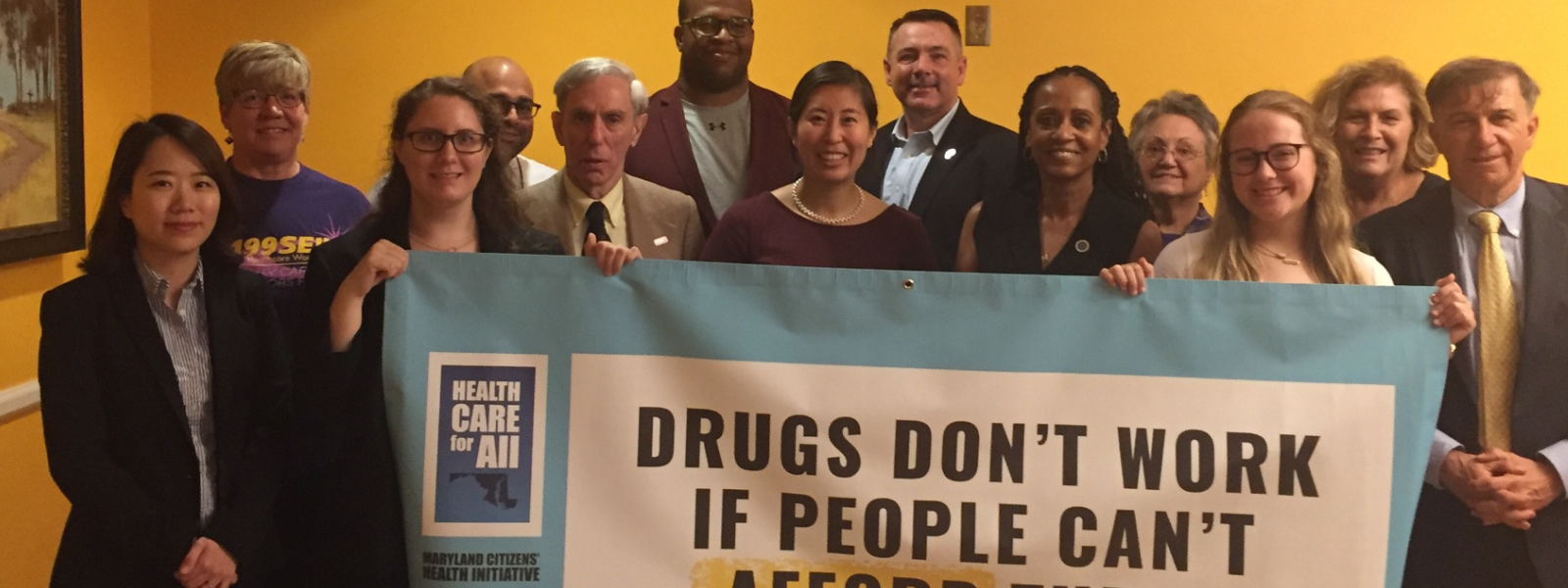We need to lower prescription drug costs for Marylanders. If you have had trouble affording any of the drugs being considered by the Prescription Drug Affordability Board (Biktarvy, Dupixent, Farxiga, Jardiance, Ozempic, Skyrizi, Trulicity, and Vyvanse) please LET US KNOW!
Urgent Need
We are all hurt by the high cost of prescription drugs, whether it is at the pharmacy counter, through our insurance premiums, or through government spending of our taxpayer dollars. These skyrocketing costs place considerable burdens on our families and neighbors. Unfortunately, the problem is getting worse, with drug corporations increasing prices for some drugs by more than five times the inflation rate as recently as July 2023. As these costs continue to soar, many Marylanders will continue to face difficult decisions paying for their lifesaving medications or other necessities.
A new approach to bringing down costs
In 2019, the Maryland General Assembly created the first-in-the-nation Prescription Drug Affordability Board (PDAB), a landmark approach to address the skyrocketing costs of medicines which is now being replicated across the country. The PDAB, which is chaired by former Maryland Health Secretary Van Mitchell, has the authority to implement upper payment limits to make high-cost drugs more affordable for state and local governments, which it will soon establish with the approval of the Legislative Policy Committee. This initial phase will lay important groundwork for cost reviews and drug selection that will help the PDAB moving forward.
Action required in 2025 to help all Marylanders
The over 450 faith, community, labor, business and health care organizations from across the state that belong to the Prescription Drug Affordability Coalition strongly urge the Maryland General Assembly in 2025 to expand the authority of the Prescription Drug Affordability Board so that it can implement upper payment limits to make high-cost drugs more affordable for all Marylanders. Key local leaders across Maryland join this call to action (see this Jan 2024 Op-Ed in the Baltimore Sun from our lead sponsors and the ad featuring county executives below). Colorado and Minnesota have since created PDABs, based on Maryland’s model with this full authority.
Take Action
Sign up for Email
Be among the first to know about how you can take action to support prescription drug affordability in Maryland.
- We promise not to inundate your inbox.
Share your story
Are you directly affected by high- cost drugs?
We want to hear from you! Send us your story through the form below.
- We always respect your privacy.
- If you prefer to share your story over the phone or in-person, call us at (667) 212-2048.
Sign our resolution
Encourage your organization to join hundreds of faith, business, labor and other organizations working to make prescription drugs more affordable.
Past Advocacy:
2021 Secured Funding for the Prescription Drug Affordability Board
In 2021 we successfully urged the Maryland General Assembly to override the veto and fund the Prescription Drug Affordability Board. See our full statement. The Board is set to publish an upper payment limit action plan by the end of 2024. We coordinated a panel of local leaders to urge the Stakeholder Council and the Board to take swift and decisive action to provide relief to Marylanders. See the letter from these leaders here.
2019 Maryland Prescription Drug Affordability Board
In 2019 Maryland became the first state in the nation to have a Prescription Drug Affordability Board which will work to make high cost prescription drugs more affordable for Marylanders (Summary of the Law, Polling of Maryland’s Support)
But in May 2020, Governor Larry Hogan vetoed legislation (SB 669/HB 1095) to create a permanent funding source for the Board by assessing a small fee on pharmaceutical corporations, pharmacy benefits managers, and insurers. By vetoing this critical piece of legislation, the Governor is putting the interests of the rich pharmaceutical corporations over the concerns of Maryland patients. During the COVID-19 pandemic we will need the Board more than ever to help make sure Marylanders can afford the vaccines and treatments they will need. The majority of Marylanders disagree with Governor Hogan’s veto.
2018 Elimination of the “Gag Rule” on Pharmacists
In 2018, together we helped Maryland become the eleventh state in the nation to ban the so-called “gag rule” by which some Pharmaceutical Benefit Managers prohibit pharmacists from telling consumers about the least expensive way to purchase their drugs.
2017 Maryland’s Anti-Price Gouging Law
In 2017, we helped Maryland become the first state to grant the Attorney General the authority to hold pharmaceutical companies accountable for “unconscionable” increases in the prices of generic or off-patent drugs. Unfortunately the Fourth Circuit Court of Appeals ruled that this law is unconstitutional.



